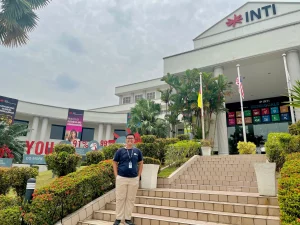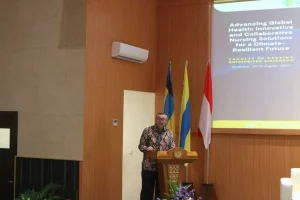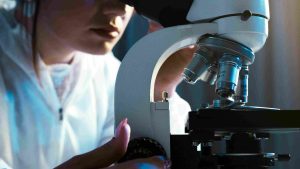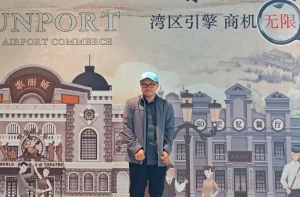UNAIR NEWS – Department of Physics UNAIR sent a staff member to the Graduate School of Engineering, Osaka University (GSE OU), Japan, as a visiting academic staff during November 2022 yesterday. The staff, Febdian Rusydi, Ph.D, was assigned by OU in 2017 and placed in the Department of Precision Science to guide post-GSE OU students. Dr. Febdian worked with Prof. Yoshitada Morikawa, a world physicist with expertise in the design of molecules and advanced materials in quantum mechanics. Since last 2020 (during the pandemic), Prof. Morikawa started involving machine learning in their main research.
Dr. Febdian met four UNAIR Physics undergraduate program alumni studying at GSE OU. Department of Physics is proud of its alumni. GSE OU is ranked 92 world QS ranking by subject, and Osaka University is ranked 68th based on QS World University Rankings. The four alumni are Enggar Alfianto (class of 2005, doctoral student), Anjar Anggraini (2006, doctoral student), Rizka Nur Fadilla (2013, doctoral student), and Samuel Masan (2016, master student). Enggar and Anjar studied in Prof. Hamaguchi’s group about plasma technology, while Rizka and Sam studied in Prof. Morikawa’s group about machine learning in quantum simulation on molecules and catalyst behavior.
The four alumni received MEXT scholarships (from the Government of Japan) as a form of collaboration between the UA Physics Study Program and the GSU OU Precision Science Masters Study Program. Dr. Febdian and Prof. Morikawa initiated this collaboration in 2015. Prof. Morikawa is a research adviser to the Quantum Engineering Design research group chaired by Dr. Febdian. In 2017, Prof. Morikawa proposed Dr. Febdian become a permanent guest lecturer at the GSU OU Precision Science Masters program, a position he has held until now. Dr. Febdian helped Prof. Morikawa mentor Rizka and Sam in research and education.
On that visit, Dr. Febdian took the time to interview Prof. Morikawa. The main topic of discussion is the globalization of education and research reflected in world rankings.

Japanese government’s attitude towards University Rankings by QS
Prof. Morikawa explained that initially, the Japanese government did not really follow the rankings conducted by independent institutions such as QS. The Japanese government has its own ranking system, the main weight is the number of publications that penetrate the world’s top 10 percent of journals and the number of grants received by lecturers from these universities. The government’s internal ranking is used to determine policies to improve universities in Japan.
“The Japanese government should also start considering rankings by independent institutions such as QS. Because the ranking is good for introducing Japanese universities to the world and increase the attraction of prospective foreign students,” he said.
Good practice in research management by balancing research quality and grant responsibility
Prof. Morikawa recounted his personal experience in conducting research. Although personal, the experience is similar to that of top professors in Japan.
The first thing to do is not to write a research proposal without having the results yet. “We have to have results, at least preliminary results, so that we can convince the jury that our proposal is prospective.”
Second, ensure the research we do is needed, both in the world of science and technology. The research must fill the knowledge gap.
Third, if you have received a grant, use some of the funds to fund further research. That part is the most difficult and requires good cooperation between the professor and his team (including the students involved).
Fourth, be patient. Quality research is not made overnight. Failure is normal. Likewise publication, it takes time.
Besides that, Prof. Morikawa highlighted that grant regulation may differ from country to country. In Japan, the duration of grants is usually three years, and new researchers can publish in the fourth and fifth years. In addition to publications, grants also require the graduation of students involved in the grant.
Research positions in higher education
Prof. Morikawa believes that research should be at the center of education in higher education. Students, including undergraduates, are not only taught from textbooks but also from the latest research conducted by lecturers. Such method accelerates the formation of a research culture within the department, making it easier for department managers to improve the quality of postgraduate schools and the quality of research.
“Undergraduate degree is very important to prepare for a master program. I feel that the best students who graduate from UNAIR are highly educated. So, I hope you continue to further education. So we are delighted to accept UNAIR students to OU.”
Author: Febdian Rusydi
Editor: Khefti Al Mawalia









